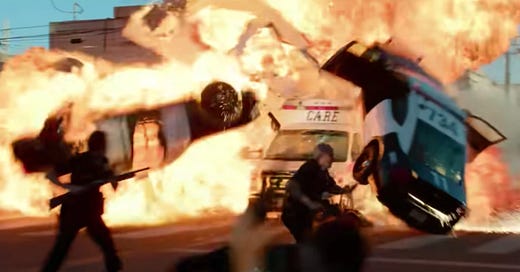'Ambulance' Is the First Blockbuster About the Horrors of American Healthcare
We're all held hostage by health insurers, hospitals, and price-fixing.
Spoiler alert for the plot of Ambulance, if you’re the kind of person who would get very upset about knowing how Ambulance ends.
Michael Bay’s newest release, a bank heist-turned-car-chase movie called Ambulance, begins and ends with Americans quite literally begging for healthcare.
When the movie opens, Will Sharp (played by Yahya Abdul-Mateen II) is a Marine on the phone with a health insurance company. The fact that he’s a veteran is meant to bring his treatment by the customer service representative on the other end of the line into even more stark relief—I’m reminded of Donald Trump memorably griping that we don’t take care of our war veterans in this country—but it’s an unavoidable experience if you get sick in America. It’s a scene so instantly relatable for Americans: Will is pleading with a numbered (not even named) agent over a surgery his wife needs, telling them “this is real life” to remind them of the stakes. He’s being directed to go back online or call back when all he wants is to stay on the phone with an actual person; it’s crystal clear that this is far from his first call.
This is what interacting with healthcare, which is to say health insurers, is like in this country: a lot of time on the phone, being endlessly routed around, and, ultimately, never getting the answer—or the help—you desperately need.
It’s this conflict that propels Will into the drama of the movie. He goes to see his brother, Danny (manically played by Jake Gyllenhaal), looking for work, and happens upon him as Danny and his ragtag crew are just about to shove off to rob a Los Angeles bank. It’s Danny’s 38th bank robbery in 10 years, and Danny and Will are the sons of a stone-cold criminal, so this should go off without a hitch (ha, ha) for an easy multi-million-dollar payday. But as Heat made canon, the plan is only ever as good as the guys behind you, and one of Danny’s guys is wearing Birkenstocks. Things start to go sideways almost immediately. As the brothers’ messy escape begins, Will shoots a cop, who’s taken on board an ambulance (which belongs to a real private ambulance company with contracts in California; this goes unremarked upon in the movie). Danny and Will steal the ambulance as a getaway vehicle, taking the cop and EMT Cam (Eiza González) as their hostages. This sets off a chase that involves untold billions in cop toys and manpower, almost every major highway in the LA area, and a ton of explosions to boot.
Now, am I going to pretend that this movie, from the guy who most recently made a whole series of Transformers movies, is perfect politics? Of course not! Action movies are a reactionary medium, despite being fun as hell. Still, it’s clear what Bay is trying to say here: We’re all held hostage by the American healthcare system. If you have health insurance, you rationalize that you’re better off than the uninsured, but you still have the sneaking suspicion that when the worst happens, it won’t feel that way. Faced with gun-to-head negotiations like “another round of chemo for your wife or your house payment,” you have far less leverage (read: none) even than the Sharp brothers in the ambulance, who at least had an EMT and a wounded cop to bargain with.
In life-or-death situations, people will go to extraordinary lengths to get what they need in order to survive. When the ambulance finally comes to a stop, both brothers end up wounded, laying face down on the ground in handcuffs. Will’s wife, who’s arrived at the scene with their young son, is screaming for someone, anyone, to provide her husband with medical treatment. The cops just keep standing around; one tells the EMT that, basically, they’ll get to him when they get to him—they’re in no rush to save a cop-killer. Finally, the EMT crosses the crime scene tape, intervening to begin life-saving treatment, without it, a whole bunch of people empowered by the state would have stood around and watched a man die a preventable death. Remind you of anything?






Anyone else have the sneaking suspicion that this is the only vocabulary Michael Bay has? Like, he watched the news over the last two years, tried to process the unfamiliar human emotions starting to seep into his consciousness, and the only way he could express his pain and despair at the State Of Things is to make Yet Another Michael Bay Action Movie, because it's the only way he has to express his feelings.
I like to imagine Michael Bay can't even have a normal conversation without a related action sequence buzzing through his head.
This article is 'John Q' erasure.